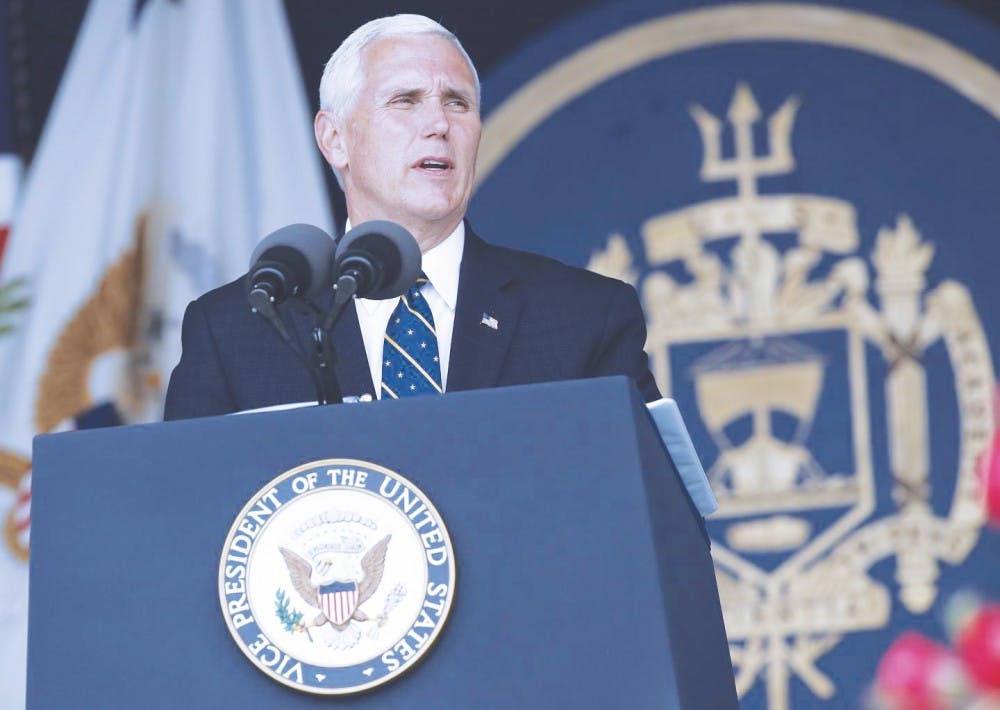Taylor Burns | Contributor
"The selection of Pence… is deeply disappointing, for me, and many of its faculty," Amy Peterson, adjunct professor of english, writes in the Washington Post detailing the events following the faculty meeting that announced the vice president as the commencement speaker.
"It reflects a failure of the university's leadership to live up to its mission," Peterson continued. She is not the only critic of the vice president speaking at graduation; many students and faculty have been critical, but as I flip through the Echo, and scroll through social media, a recurring message appears: "Vice President Pence is a Christian man; why are you protesting him?"
It seems that many on campus do not understand why people are "deeply disappointed" and why Pence does not "live up to (Taylor's) mission." So my hope is to create a timeline of Pence's public life to provide a background of why people are dissenting.
I need to start by saying I am a straight, white, Hoosier male that saw the indirect impact of Pence's policies, and my words cannot match the sentiment that marginalized people felt, but I'll try my best.
Pence's controversy began in 2000 when he won a seat in Congress. Two more famous moments are Pence advocating for conversion therapy in response to the "Ryan White Care Act," and support for "Don't Ask Don't Tell," a law that discriminates against LGBTQ+ individuals in the military. These policies caused people harm, whether psychological or physical. While Pence claims that these policies are biblically motivated, it's a shame that these verses were used to harm people.
In 2012, Pence won the Indiana gubernatorial race, beginning four years of discriminatory policies.
First, there was a controversial Syrian refugee ban.
"The governor of Indiana believes, though without evidence, that some of these persons were sent to Syria by ISIS to engage in terrorism and now wish to infiltrate the United States in order to commit terrorist acts here," Indiana Judge Richard Posner said.
This policy sundered Syrian families, and as Posner said, no evidence was evident, suggesting that Pence was only inciting panic of Syrian Muslim people.
The second policy was the Religious Freedom Restoration Act. Backed by many religious lobbyists, Governor Pence signed this act that included language that would allow businesses to discriminate against LGBTQ+ people and other minorities. Pence even said, "It was 'absolutely not' a mistake to sign RFRA," even though it put "Indiana into a $250 million economic panic" according to the Indiana Democratic Party website. This law hurt people and made them feel unloved.
Even successes for Pence were limited. His economic policies created a state surplus, but minimum wage stayed unchanged and the wealth gap increased. His education policies were great, for suburban predominately white schools, while inner-city schools suffered. Additionally, he restricted healthcare for poor Hoosier families, was unresponsive to opioid/HIV epidemics and nearly refused to provide a life saving needle exchange program, according to Gail Collins in her New York Times article.
As vice president, his colors have not changed. He was instrumental in banning transgender individuals from military service, and encouraged the president on the Muslim ban and harsh border and immigration laws.
The truth is that Pence's policies have hurt many people, both off and on our campus. And these pains are driven by deeply-rooted ideologies, making it nearly impossible to support him as a person from his politics. This is why we protest. A man whose career is marked by homophobia, islamophobia and bigotry does not represent Taylor's mission, and should therefore not be giving the final message to the seniors.





